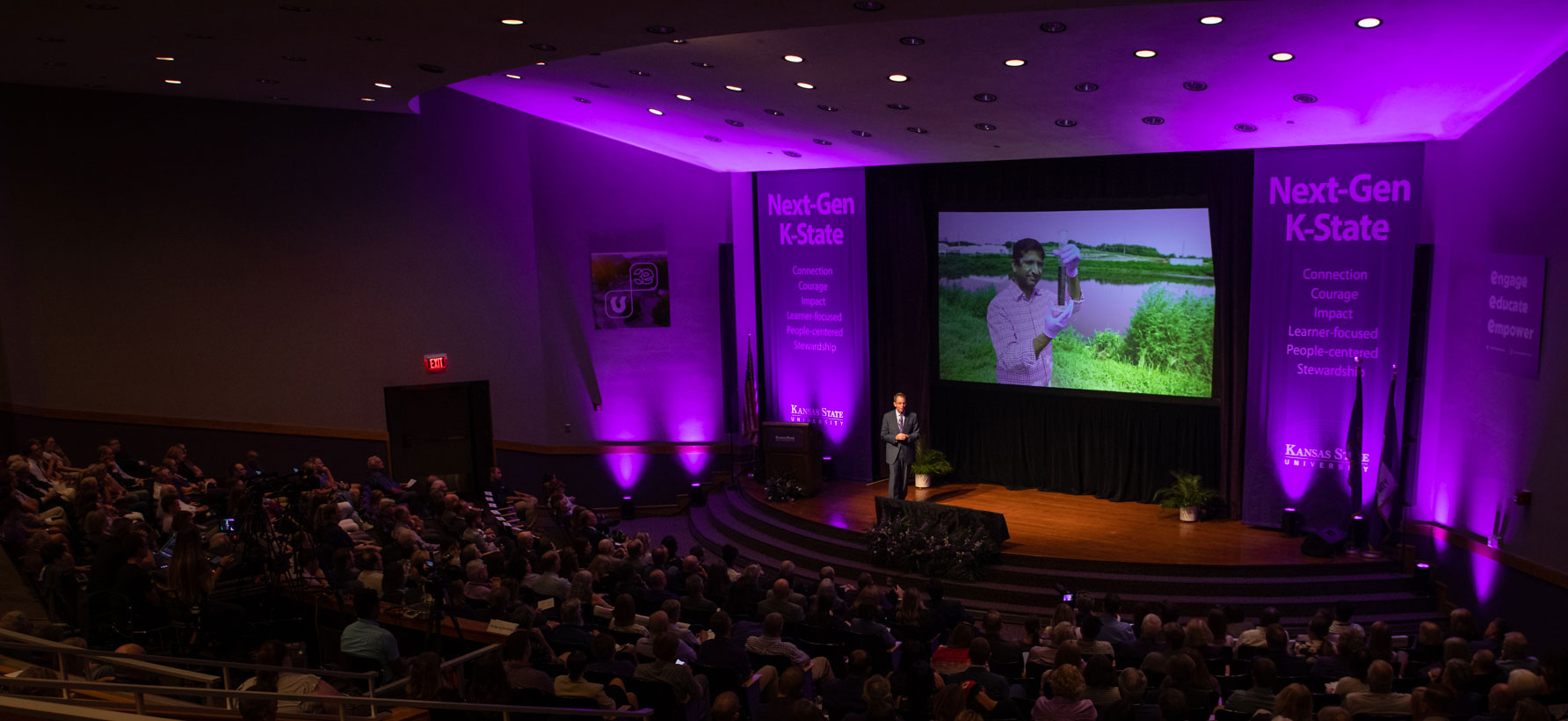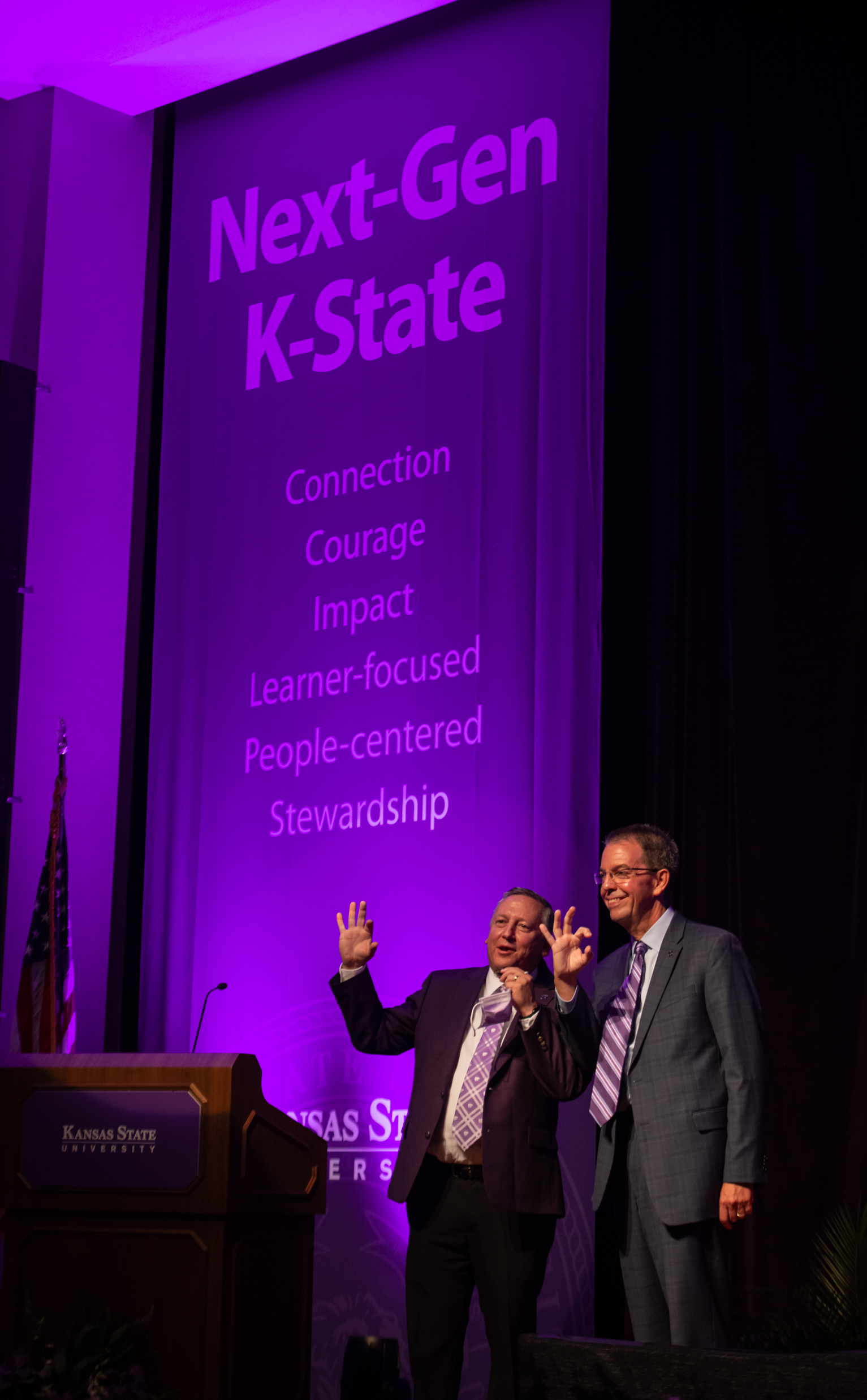K-State reimagines educational access, opportunity in bold new strategic plan
Friday, Sept. 8, 2023

Kansas State University is leaning into its land-grant heritage and mission by reimagining educational access and opportunity with today's launch of its Next-Gen K-State strategic plan. | Download this photo.
MANHATTAN — Kansas State University is leaning into its land-grant heritage and mission with today's launch of its Next-Gen K-State strategic plan.
Built from input from more than 10,000 students, faculty, staff, alumni, donors and other university stakeholders — including the 2,457 Kansans who participated in last academic year's regional community visits across the state — the plan outlines how the university will transform to serve new kinds of learners, solve grand global challenges, and contribute to the economic prosperity of the state.
"Being a next-generation land-grant university requires us to renew our commitment to the land-grant mission, which is all about access and opportunity," said Richard Linton, K-State president. "But access and opportunity today means something different than it did in 1863 — we must evolve to meet the needs of today's learners who are seeking different kinds of training and education, and we must embrace our responsibility to serve the state, nation and world through research and engagement in new and exciting ways."
The plan, which outlines key priorities for the institution, four distinct opportunity areas for interdisciplinary focus, and 17 relevant measures of success, will guide the university through the year 2030. Specific goals around student enrollment and retention, academic innovation and applied learning experiences, research growth and impact, and engagement and economic impact will define the future of the university.
Linton added, "As the nation's first operational land-grant university, we view it as our responsibility to redefine what that means in modern-day contexts — and by delivering unmistakable value to all who wish to learn, grow and prosper, we will set the standard for what a highly engaged, people-centered, and learner-focused university can and should be."
The plan can be viewed in full at k-state.edu/next-gen.
Redefining student populations
K-State is consistently recognized by The Princeton Review for a variety of student experience and support rankings, including boasting some of the nation's happiest students. The Next-Gen K-State strategic plan recognizes that to continue to meet the needs of all students, K-State must expand its offerings.
"Critical to the Next-Gen plan is this idea of strongly connecting our program offerings with industry and workforce needs," Linton said. "Not all who are seeking education today are looking for a traditional degree — we need to be ready with a full suite of program options that meet students where they are."
By expanding the makeup of K-State's student body to include more certificate-seeking students, microcredential-seeking students and more, the university has outlined a pathway to grow to 30,000 learners by 2030.
"That doesn't mean 30,000 students on the Manhattan campus or across our physical campuses, nor is it 30,000 degree-seeking students — it's 30,000 citizens of the world accessing the opportunity to learn how they want, when they want, for whatever reason they need," Linton added.
Growing research and setting the K-State Opportunity Agenda
When it comes to the research arm of the university, the strategic plan outlines a goal of increased annual research expenditures, growing the university's research enterprise by this measure to $300 million by 2030.
The university has also identified four interdisciplinary areas of focus where K-State believes it is uniquely positioned to serve: community health and well-being, sustainability, global food security and biosecurity, and enabling technologies. These four areas make up what the university is calling the K-State Opportunity Agenda.
"We are bringing our resources and expertise together across these four areas that are broad enough for everyone to find their place within them but specialized enough that this institution will be able to bring its expertise to bear on a grand scale," Linton said.
Serving the needs of Kansans
While the K-State Opportunity Agenda dives into key areas of need for the state, the university will leverage other pathways and initiatives to bring the full breadth of the university's expertise and resources right to the greatest areas of need in Kansas.
"Outreach is core to the land-grant mission, and K-State's Extension network gives us an incredible infrastructure that allows us to share expertise, create connections and deliver solutions across the state," Linton said. "By leveraging this infrastructure in new ways — and with new partners — we are committed to being part of an effort to build additional capacities and strengths in all 105 counties of Kansas.
"That's what this is really all about: Being the most relevant university for the needs of Kansans and our state, and then scaling that up to solve national and global challenges in service of a better world for us all."

